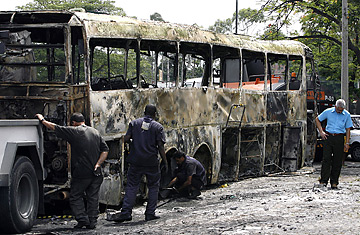
Workers inspect a bus burned during an attack by armed gangs in Rio de Janeiro, Brazil on December 28, 2006.
"It's not normal but it has become normal," secretary Sandra Maria said of the orgy of bloodshed that left 19 people dead and at least 20 more injured. "Incredible as it may seem, we are used to all this shooting. We've adapted."
Almost all my Brazilian friends have been carjacked or held up at gunpoint — my own car has been broken into 16 times and the day before Christmas police arrested three men trying to force their way into my apartment — but even I was surprised by the scope and barbarity of the attacks. Rio is famous for its casual and carefree attitude to advance planning, and I'd always joked that Sao Paulo's bandits were better organized than their Rio counterparts. When drug gangs brought Sao Paulo, a city of 19 million that is Brazil's business and industrial capital, to a standstill in May with a four-day orgy of violence that left close to 200 people dead, I felt vindicated.
This holiday season, though, Rio's organized crime proved me wrong. In the early hours of Dec. 28, the drug gangs that control most of Rio's 600-odd favelas, or shantytowns, launched a coordinated series of attacks across the famously beautiful city. In the most horrific incident, thugs torched an interstate bus with the passengers still on it, burning eight people alive. It was an unmistakeable message to authorities on the eve of new governor Sergio Cabral's swearing-in: we will not sit back and let you curtail the cocaine and marijuana dealings that bring us millions of dollars each month.
Most Cariocas got the message. Some shops and bars were closed the next day as rumors of a new attacks spread. Buses remained in their depots. Many people, petrified of getting caught in the crossfire, locked their doors and sat at home. The federal government agreed to send reinforcements and Cabral publicly acknowledged Rio faces a serious problem; that was a sharp contrast to his predecessors, whose consistent denials that Rio is no more dangerous than London or New York beggared belief.
I wish him well. But I can't help thinking that things will get worse before they get better. Reports that plainclothes police are forming militias to take on the drug gangs can only lead to more bloodshed. The only saving grace is the locals' characteristic optimism.
Even with their beach heaven going to hell, Rio residents laughed it off. Small businessman Paulo Rodrigues came to work and found two burnt-out cars blocking the road in front of his tiny shoe shop. When he heard of similar incidents on the normally safe South Side of Christ the Redeemer and Sugarloaf mountain, he couldn't resist a wry smile. "They're seeing it in Ipanema now," he chuckled quietly. "They've globalized violence."
